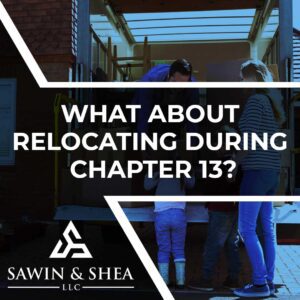Bankruptcy filings in the United States are on the rise, with a recent 10% increase. Many people are also struggling to find employment and housing, so they may need to move to another location during bankruptcy.
What if you find a job in another state? Can you move out of state while in Chapter 7 bankruptcy? These are excellent questions, and in this article, we’ll present information to help you understand the impact of a move during bankruptcy.
Can I File for Bankruptcy in Another State?
Under the U.S. Bankruptcy Code, bankruptcy laws are federal laws. While some bankruptcy exemptions and rules vary from state to state, your Chapter 7 bankruptcy will be handled in federal bankruptcy court.

File for bankruptcy in the federal district where you have lived for the majority of the previous 180 days. Don’t be tempted to move somewhere else because you think you’ll gain certain bankruptcy benefits. The federal government designed residency requirements to prevent abuse of the system. You can move to another state after filing for bankruptcy, but your bankruptcy may still be based on your previous residence.
If it looks like you’ll need to move out of state during the bankruptcy process, work with an experienced bankruptcy attorney who can help you manage the details of your situation. Your bankruptcy attorney can help you understand details like residency issues and location-appropriate exemptions and advantages.
Can You Move Out of State While in Chapter 7 Bankruptcy?
To find what bankruptcy exemptions that you will use to determine the property you can exempt from liquidation in a Chapter 7 case, there is a 24-month from filing date calculation. Otherwise, your bankruptcy will be based on where you lived the majority of the previous 180 days.

So yes, you can move out of state during Chapter 7 bankruptcy, but your bankruptcy may still be governed by the state you left. Also, some states will only allow someone to use their exemptions if they are currently living there. In this situation, you may miss out on valuable exemptions.
Prevent this situation by beginning the bankruptcy process before moving or taking a job out of state. Remember that if you eventually move away, you may need to travel quite a distance to return for a court-ordered appearance. Some courts will allow online video conferences or phone meetings instead of in-person meetings, but this is not guaranteed.
What is the 730-Day Rule?
The 730-Day Rule is another term for the two-year requirement mentioned above. Under the 730-Day Rule, you must have lived in a state for two consecutive years before your bankruptcy filing date to claim it as your filing location for exemption purposes.
It’s worth noting that Chapter 7 bankruptcy typically takes about four to six months to complete. Avoiding moving during this time may simplify your situation and allow the bankruptcy to move along most quickly.

What About Relocating During Chapter 13?
Chapter 13 bankruptcy, also known as a debt reorganization, usually takes three to five years to complete. It may be challenging to avoid moving to another location during such an extended period.
Moving within the same state shouldn’t impact your bankruptcy reorganization plan, but you should still notify the courts, creditors, and your attorney. Moving out of state should still allow you to continue your Chapter 13 reorganization plan, but it may complicate your situation. Speak to your bankruptcy attorney immediately if you suspect you may be moving to another state soon.
Sawin & Shea: Experienced Indiana Bankruptcy Attorneys
If you still have questions about whether you can move out of state while in Chapter 7 bankruptcy, please reach out to the experienced team at Sawin & Shea. We offer a free video consultation about Chapter 7 and Chapter 13 bankruptcy, so it’s easy to start quickly on the road to financial recovery.
The Indiana bankruptcy attorneys at Sawin & Shea, LLC have been helping people navigate the bankruptcy process for years. If you’re considering filing for bankruptcy before, after, or during a move to another location, please schedule a free consultation today at 317-759-1483.



